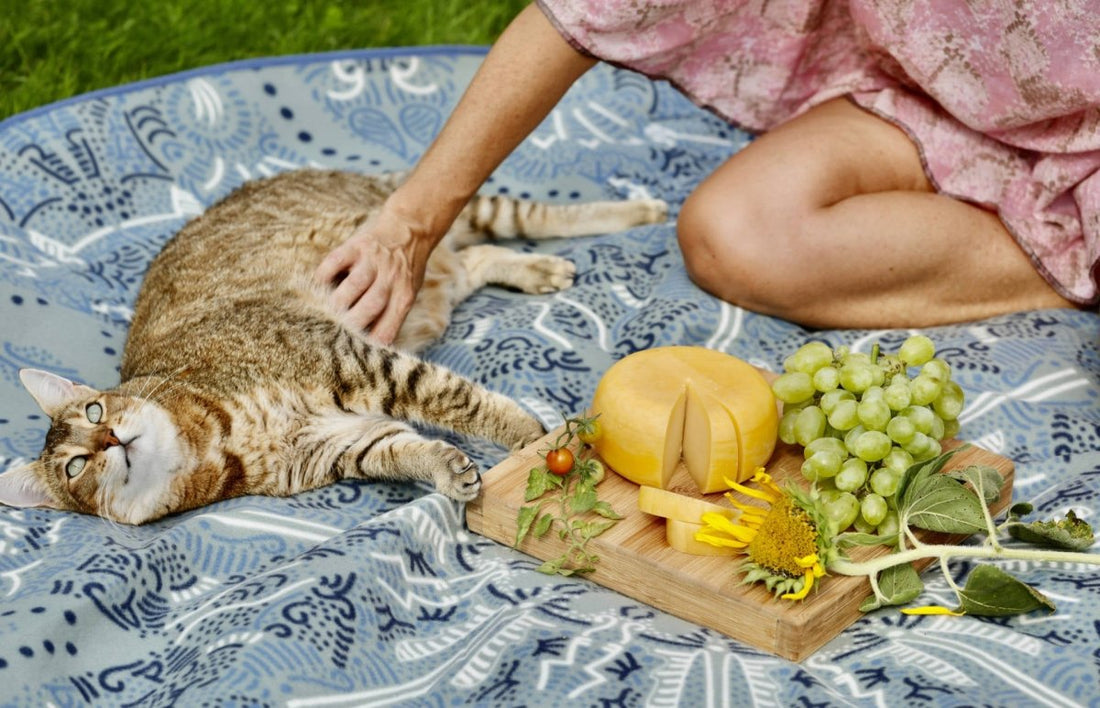Cheese for cats: tasty snack or better avoided?
Cheese is a popular snack and ubiquitous in many households. But what about cats? Can cats eat cheese? The answer is: Yes, but only in small amounts, and not all cheese is suitable. In this blog, you'll learn whether cheese is healthy for cats, which types are allowed, and how to feed them safely and correctly.
Can cats eat cheese? The short answer
Yes, cats can eat cheese, but only occasionally and in very small amounts. Cheese is not a natural food for cats and can cause digestive problems if consumed in excess. Some types of cheese are more suitable than others.
What is allowed?
- Small amounts of mild cheese such as cottage cheese, mozzarella or Gouda.
What is forbidden?
- Cheese with high salt content, spices or mold.
The benefits of cheese for cats
Cheese contains several nutrients that can benefit your cat in small amounts. Here are the main benefits:
1. Protein source
- Cheese contains high-quality protein that supports your cat's muscle mass.
2. Calcium
- Promotes bone health and strengthens teeth.
3. Healthy fats
- In moderation, the fats in cheese can provide energy, especially for active cats.
4. Taste
- Cheese can be an incentive for picky cats to take medication, for example.
Which types of cheese can cats eat?
Not all cheese is suitable for cats. Some varieties are unsuitable due to their high salt or spice content, while others are well tolerated.
Suitable cheeses:
- Cottage cheese: Low in calories and easy to digest.
- Mozzarella: Mild and low in fat.
- Gouda: Unproblematic in small quantities.
- Cream cheese (natural): No sugar or additives.
Unsuitable cheeses:
- Blue cheese: Contains mold that can be toxic to cats.
- Parmesan: Very salty and difficult to digest.
- Cheese with spices: Garlic, onions or peppers are poisonous to cats.
- Processed cheese: Often contains additives and a lot of salt.
How much cheese can cats eat?
The right amount is crucial so that cheese remains an occasional treat for your cat and does not become a burden on digestion.
Recommended amount:
- Small cats: One tiny cube (approx. 1x1 cm) per week.
- Medium-sized cats: Two small cubes per week.
- Large cats: Up to three small cubes per week.
Risks and precautions for cheese
Although cheese is safe in small amounts, there are some risks you should be aware of:
1. Lactose intolerance
- Many cats are lactose intolerant and have difficulty digesting dairy products. This can lead to diarrhea, flatulence, or vomiting.
2. Salt content
- Some cheeses contain a lot of salt, which can put a strain on your cat's kidneys.
3. Obesity
- Cheese is high in calories and can lead to obesity if consumed in excess.
4. Additives
- Processed cheese and processed products often contain unhealthy additives such as sugar or preservatives.
5. Allergies
- Some cats are allergic to milk proteins. Watch for symptoms such as rashes or itching.
How do you properly feed your cat cheese?
Proper preparation and feeding of cheese is important to avoid health problems. Here are some tips:
1. Cheese in small quantities
- Start with a small portion to ensure your cat tolerates the cheese well.
2. Natural
- Feed only natural cheese without spices or additives.
3. Fresh and low in fat
- Choose low-fat cheese to minimize calorie intake.
4. Not regularly
- Cheese should only be given as an occasional treat and not as part of the daily diet.
5. In combination with medication
- If your cat needs to take medication, you can hide it in small portions of cheese.
Creative ways to prepare cheese for cats
Cheese doesn't have to be boring! Here are some ideas for offering it to your cat:
1. Cheese cubes as a snack
- Cut the cheese into tiny cubes and serve it as a reward.
2. Cheese topping
- Sprinkle grated cheese over your cat's wet food to make it more palatable.
3. Cheese filling
- Hide small pieces of cheese in a cat toy to encourage your cat's hunting instinct.
4. Homemade cheese treats
- Mix cottage cheese with tuna and form small balls that you can freeze.
When should you not give your cat cheese?
In some cases, cheese is unsuitable for cats:
1. Digestive problems
- Cats with sensitive stomachs or lactose intolerance should not be given cheese.
2. Obesity
- Cheese is unsuitable for overweight cats because of its high calorie content.
3. Allergies
- If your cat is allergic to dairy products, it should not eat cheese.
4. Special diets
- Cats with kidney problems or other health problems should only be given cheese after consulting a veterinarian.
Frequently asked questions about cheese for cats
“Can kittens eat cheese?”
Yes, but only in very small quantities and as an exception.
“Is cheese poisonous to cats?”
No, cheese is not poisonous, but if consumed in excess or if you are lactose intolerant, it can cause digestive problems.
“Which cheese is suitable for cats?”
Mild, natural cheese such as cottage cheese or mozzarella is best.
“What alternatives are there to cheese?”
Cooked chicken, fish or special cat food are healthy alternatives.
Conclusion: Cheese for cats – occasionally allowed, but not too much
Cheese can be a delicious addition to your cat's diet when fed in small amounts and properly selected. Key points at a glance:
- Safe: Mild, natural cheese without spices or additives.
- Benefits: Good source of protein and calcium.
- Caution: Beware of lactose intolerance, high salt content and calories.
With these tips, you can safely offer your cat cheese without worry. They'll love the delicious snack—and you can indulge them with a clear conscience!



